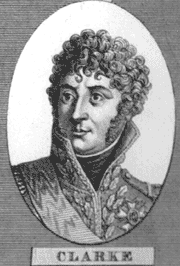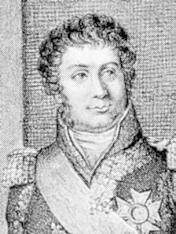Marshal Clarke (Landrecies 1765
- Neuwiller 1818)*
Napoleon's minister of war *
* Napoleon's minister of war *

Although his family was primarily of Irish descent, Henri Clarke was born in Landrecies in 1765, in a century when our town was at the peak of its military tradition. That's probably why he enrolled very early in the French royal army. The French revolution and its countless battles gave him the opportunity to be promoted several times.
As soon as the Empire was established in 1804, Clarke became very close to Napoleon, because he had already fought on his side during a campaign in Italy in 1796. Until 1806, Napoleon's minister of war was named Berthier. He was doing pretty well since France was winning a lot of battles in that period. And yet there was a problem : Berthier wasn't only a minister, he was also a military commander, and when Napoleon went campaigning somewhere in Europe, he had to follow him. In that case, the ministry in Paris was left empty. So it became more or more obvious to the Emperor that Berthier couldn't be a minister and a military officer at the same time.
That's why Berthier was replaced with Clarke at the head of the ministry of war. Clarke officially became the new minister on August 9, 1807.
Clarke quickly proved to be an excellent minister : he was both loyal and able to have initiative if he had to. One of his greatest skills was to write very concise and accurate reports for Napoleon about a particular issue : after reading them the Emperor usually answered with a mere "Approved" or "Disapproved". Napoleon gave a surprisingly free hand to Clarke, because he knew that his minister would always abide by his point of view anyway. Indeed Clarke never abused his power and when the Emperor was campaigning far away, he only did things that he thought Napoleon would approve of.
In 1809 Clarke got at the height of his powers. While Napoleon was far from France, Clarke successfully organized the defense of Holland (which was under French domination) against a British assault. The Emperor was greatly impressed, and he made his faithful follower duke of Feltre on the same year. Clarke became one of the most important men in France.

And yet, Clarke progressively fell into disfavour, and his relationship with the Emperor deteriorated. There were several reasons for that, and first of all was general Malet's conspiracy in 1812. At that time, Napoleon was campaigning in Russia. Malet, who had remained in Paris, claimed that the Emperor had died and organized a coup. His bold plan was a disaster and he was shot. However Napoleon held a grudge against Clarke, because the minister was in Paris and had failed to react.
The second reason was that the campaign in Russia ended in a terrible way at the end of 1812. Napoleon unfairly accused his minister of war of being partly responsible for that, and he confiscated a lot of his powers. In April 1813, the Emperor appointed a man called Pierre Daru to an important job in the ministry of war : Daru was probably backed by Napoleon, and he quickly became the real head of the ministry.
In 1814 the end of the Empire was near as enemy troops were approaching Paris. Clarke was officially entrusted the defense of the capital by Napoleon. But actually this mission was given to an improvised "defense council", and thus there was nothing Clarke could do.
Because of all these humiliating rebuffs, Clarke didn't hesitate to rally the new power of Louis XVIII when Napoleon abdicated. He proved his loyalty to his new leader when he followed him to Ghent in Belgium during Napoleon's brief return to power. Louis XVIII always felt grateful towards him for this choice : the king made him minister of war again, and in July 1816, Clarke received the glorious title of French Marshal.
